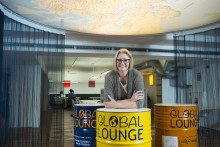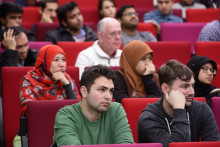In late 2023, you held a language session and interviewed many people in the organisation. What stood out?
Van Luijk: 'The great thing about the language session was that people from both 'camps' - people who think Dutch is under threat, and worried internationals - were present and showed a lot of understanding. They understood each other's views, even if they did not agree with each other.'
Hunfeld: 'The organisational language is something that concerns us all. You also noticed it when the current policy was introduced: something is changing, what does that mean for me? And for my work? That causes unrest and people are prone to get defensive.'
In the language session, a speaker argues that requiring Dutch creates an uneven playing field. It would even make UT a less attractive place to work. Do you share that view?
Van Luijk: 'We have to be realistic: learning B1-level Dutch - that means being able to do just a bit more than telling people who you are and where you live, say a reasonable conversation at the coffee machine - already requires hundreds of hours on average. You have to schedule that time alongside your job or studies. Don't underestimate the impact of that. The comparison is sometimes made the other way round: when you, as a Dutchman, have to learn (better) English, but the starting point is completely different. Not everyone is equally proficient in English, but in that we all have a basis.'
Does that relate to another speaker's statement? 'Language proficiency means power.'
Van Luijk: 'Partly, but that's more about communication, like participating in a discussion. I think that is perhaps the biggest asset of our current language policy: participation is accessible. Fourty percent of the community is international, but everyone can participate in participation bodies.'
Hunfeld: 'Anyone can learn Dutch, but before you are at the level to participate in a formal discussion in a nuanced way, you are years away. You can't do that with a B1 level. What is also not a good thing: learning a completely new language while you already have to improve your English academically during your studies. Because don't forget: for the majority of our community, English is the second language.'
Yet there are voices that universities have gone too far with the English language. How do you see this?
Hunfeld: 'What I find so appealing about the UT is that we took the decision to adopt English as a common language, but have been dealing with it pragmatically since 2020. There is no language police here. We find a way in this together. That is why we are conducting this interview in Dutch. At the time, we made formal agreements, but if these prove to be unworkable in practice, we always come to an agreement.'
The Executive Board indicated in September that it would open the door to 'parallel bilingual' language policy. Where are we now?
Hunfeld: 'With all the input we gathered in interviews, but also in the language session, we are writing a proposal, point by point, with a number of conventions. That goes to the Executive Board in February and comes to the University Council a month later. About the content: it's actually not very special. We formally write down how we work with language at the UT, in practice.'
Van Luijk: 'It's good to make it clear that the language of instruction of programmes is completely outside this proposal. We are only talking about the language of instruction at the UT, the 'organisational language'. In this, we do distinguish between formal language, such as a newsletter, events and policy documents, and informal language at the coffee machine. So the proposal is not an adaptation of the integral language policy.'
Are you worried about the feasibility of bilingualism?
Hunfeld: 'If you really want to translate everything, that creates a lot of work. That is precisely why we opted for parallel bilingualism. This means that you don't always offer everything in two languages, but decide organically: what is useful to use here. There are organisations that operate in institutional bilingualism, but we deliberately don't go for that.'
Van Luijk: 'There is, however, a danger in parallel bilingualism. A different language per layer or level can lead to Dutch slowly becoming the standard again. That translating a policy document no longer happens. You have to watch out for that, but we are aware of it.'
Do you see more potential bottlenecks in the near future?
Hunfeld: 'I don't rule out a huge influx in Dutch courses. We already saw a considerable increase when the discussion about internationalisation started. We have to be very creative with that. After all, everyone has different wishes and we have to take into account huge shortages in teaching capacity. Dutch teachers are almost impossible to find, which could become a major problem. We are already preparing for that with the trade association and the other universities.'
Do you - in anticipation of the new policy or legislation - already have tips for employees or students struggling with language issues?
Van Luijk: 'We hear from many internationals learning Dutch that they hardly get a chance to practice it at UT. That colleagues only speak English among themselves. For instance, agree with each other to speak Dutch at one lunch a week. In consultation, give each other space to practice. The threshold for speaking Dutch can be high, especially formally. So help each other, especially in informal settings.'






